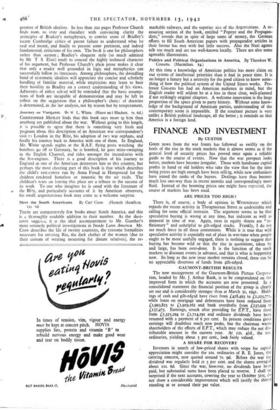FINANCE AND INVESTMENT By CUSTOS
Goon news from the war fronts has followed so swiftly on the heels of the rise in the stock markets that it almost seems as if the general level of security prices has proved once again a reliable guide to the course of events. Now that the war prospect looks better, markets have become irregular. Those with handsome capital profits in hand or old holders who take the view that for the time being prices are high enough have been selling, while new enthusiasts have joined the ranks of the buyers. Dealings have thus become much less one-way than in recent months and correspondingly more fluid. Instead of the booming prices one might have expected, the course of markets has been staid.
ARE PRICES TOO HIGH ?
There is, of course, a body of opinion in Westminster which regards the recent activity in Throgmorton Street as undesirable and calling for some official restraint. The argument seems to be that speculative buying is wrong at any time, but indecent as well as immoral in time of war. Again, rises in equity .shaxes are " in- flationary " and unhelpful to gilt-edged stocks. Frankly, I do not see much force in all these contentions. While it is true that wild speculative activity is especially out of place in war-time when people , ought to be more usefully engaged, there is nothing to suggest that buying has become wild or that the rise in quotations, taken by and large, has been over-done. It is the function of the stock markets to discount events in advance, and that is what is happening now. So long as the new issue market remains closed, there can be no appreciable diversion of funds from gilt-edged.
GAUMONT-BRITISH RESULTS The new management of the Gaumont-British Picture Corpora- tion, headed by Mr. J. Arthur Rank, is to be congramlated on the improved form in which the accounts are now presented. In a consolidated statement the financial position of the group is clearly set out and is considerably stronger than at March 31, 1941. Hold- ings of cash and gilt-edFed have risen from £428,493 to £1,225,771, while loans on mortgage Sand debentures have been reduced from £1,993,825 to £1,919,162 and bank overdrafts from £237,029 to £137,475. Earnings, struck after providing for e.P.T., have risen from £1,325,294 to £1,714,291 and ordinary dividends have been resumed with a payment of 6 per cent. In present conditions gross earnings will doubtless reach new peaks, but the chairman warns shareholders of the effects of E.P.T.; which may reduce the net dis- tributable amount in the current year. At I2S. 40., the NS. ordinaries, yielding about 5 per cent., look fairly valued.
A SHARE FOR RECOVERY
Investors in search of low-priced shares with scope for capital appreciation might consider the los. ordinaries of R. E. Jones, the catering concern, now quoted around 7s. 9d. Before the war the dividend was regularly held at 5 per cent, and the shares averaged about 11s. 6d. Since the war, however, no dividends have been paid, but substantial sums have been placed to reserve. I shall be surprised if the next accounts, covering the year to October 31st, do not show a considerable improvement which will justify the shares standing at or around their par value.


























 Previous page
Previous page